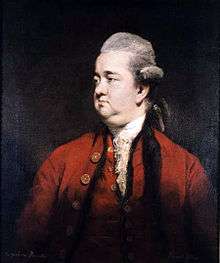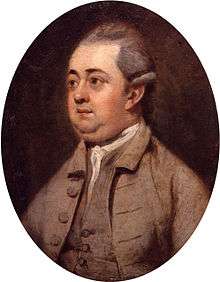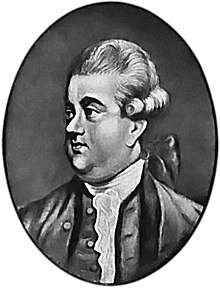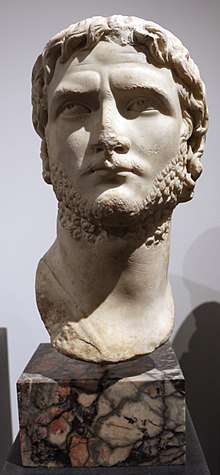
Edward Gibbon (1737-05-08 [or 1737-04-27, O.S.] – 1794-01-16) was arguably the most important historian since the time of the ancient Roman Tacitus. Gibbon's magnum opus, The History of the Decline and Fall of the Roman Empire, published between 1776 and 1788, is a groundbreaking work of early modern erudition, the broad influence of which endures to this day.
See also The History of the Decline and Fall of the Roman Empire
Quotes


- Burke's book is a most admirable medication against the French disease, which has made too much progress even in this happy country. I admire his eloquence, I approve his politics, I adore his chivalry, and I can even forgive his superstition.
- Letter to Lord Sheffield (5 February 1791) after reading Burke's Reflections on the Revolution in France, quoted in J. E. Norton (ed.), The Letters of Edward Gibbon: Volume Three 1784-1794 (Cassell, 1956), p. 216
The Decline And Fall Of The Roman Empire: Volume 1 (1776)
- For more from this see the article The History of the Decline and Fall of the Roman Empire
- The policy of the emperors and the senate, as far as it concerned religion, was happily seconded by the reflections of the enlightened, and by the habits of the superstitious, part of their subjects. The various modes of worship, which prevailed in the Roman world, were all considered by the people, as equally true; by the philosopher, as equally false; and by the magistrate, as equally useful. And thus toleration produced not only mutual indulgence, but even religious concord.
The superstition of the people was not embittered by any mixture of theological rancour; nor was it confined by the chains of any speculative system. The devout polytheist, though fondly attached to his national rites, admitted with implicit faith the different religions of the earth. Fear, gratitude, and curiosity, a dream or an omen, a singular disorder, or a distant journey, perpetually disposed him to multiply the articles of his belief, and to enlarge the list of his protectors. The thin texture of the Pagan mythology was interwoven with various but not discordant materials.- Volume 1, Chapter 2 "Of the Union and Internal Prosperity of the Roman Empire, in the Age of the Antonines". The portion regarding the views of the religions of the time taken by various constituencies has been misreported as Gibbon's own assessment of religion generally. See Paul F. Boller, John George, They Never Said It: A Book of Fake Quotes, Misquotes, and Misleading Attributions (1990), pp. 34–35.
- The bold text has been misattributed to Lucretius and Seneca the Younger.
- Antoninus diffused order and tranquility over the greatest part of the earth. His reign is marked by the rare advantage of furnishing very few materials for history; which is, indeed, little more than the register of the crimes, follies, and misfortunes of mankind.
- Vol. 1, Ch. 3 "Of the Constitution of the Roman Empire, in the Age of the Antonines"
- This has often been paraphrased: History is indeed little more than the register of crimes, follies, and misfortunes of mankind.
- Such is the constitution of civil society, that whilst a few persons are distinguished by riches, by honors, and by knowledge, the body of the people is condemned to obscurity, ignorance and poverty. The Christian religion, which addressed itself to the whole human race, must consequently collect a far greater number of proselytes from the lower than from the superior ranks of life. This innocent and natural circumstance has been improved into a very odious imputation, which seems to be less strenuously denied by the apologists, than it is urged by the adversaries, of the faith; that the new sect of Christians was almost entirely composed of the dregs of the populace, of peasants and
mechanics, of boys and women, of beggars and slaves, the last of whom might sometimes introduce the missionaries into the rich and noble families to which they belonged. These obscure teachers (such was the charge of malice and infidelity) are as mute in public as they are loquacious and dogmatical in private. Whilst they cautiously avoid the dangerous encounter of philosophers, they mingle with the rude and illiterate crowd, and insinuate themselves into those minds, whom their age, their sex, or their education, has the best disposed to receive the impression of superstitious terrors.
- The reign of Antoninus is marked by the rare advantage of furnishing very few materials for history, which is indeed little more than the register of the crimes, follies, and misfortunes of mankind.
- Vol. 1, Chap. 3. Compare: "L'histoire n'est que le tableau des crimes et des malheurs" (translated: "History is but the record of crimes and misfortunes"), Voltaire, L'Ingénu, chap. x.
- It has been calculated by the ablest politicians that no State, without being soon exhausted, can maintain above the hundredth part of its members in arms and idleness.
- Clodius Albinus surpassed both his competitors in the nobility of his extraction. Which he derived from the most illustrious names of the old Republic, but the branch from which he claimed descent had long sunk into mean circumstances, and transplanted into a remote province. It is difficult to form a just idea of his character. Under the philisophic cloak of austerity, he stands accused of concealing most of the vices which degrade human nature.
- Vol. 1, Chap. 5.
- Revenge is profitable, gratitude is expensive.
- Vol. 1, Chap. 11.
- Wit and valor are qualities that are more easily ascertained than virtue, or the love of wisdom.
- Vol. 1, Chap. 1.
- Amiable weaknesses of human nature.
- Vol. 1, Chap. 14. Compare: "Amiable weakness", Henry Fielding, Tom Jones, Book x, Chapter viii.
- In every deed of mischief he had a heart to resolve, a head to contrive, and a hand to execute.
- Vol. 1, Chap. 48. Compare: "He had a head to contrive, a tongue to persuade, and a hand to execute any mischief", Edward Hyde, 1st Earl of Clarendon (on Hampden), History of the Rebellion, Vol. iii, Book vii, Section 84.
- Our sympathy is cold to the relation of distant misery.
- Vol. 1, Chap. 49.
- The winds and waves are always on the side of the ablest navigators.
- Vol. 1, Chap. 68. Compare: "On dit que Dieu est toujours pour les gros bataillons" (translated: "It is said that God is always on the side of the heaviest battalions"), Voltaire, Letter to M. le Riche. 1770; "J'ai toujours vu Dieu du coté des gros bataillons (translated: "I have always noticed that God is on the side of the heaviest battalions"), De la Ferté to Anne of Austria.
- Vicissitudes of fortune, which spares neither man nor the proudest of his works, which buries empires and cities in a common grave.
- Vol. 1, Chap. 71.
- All gates are shut against the unfortunate.
- Vol. III
- When Gallienus received the intelligence that his capital was delivered from the barbarians, he was much less delighted than alarmed with the courage of the senate, since it might one day prompt them to rescue the public from domestic tyranny as well as from foreign invasion. His timid ingratitude was published to his subjects, in an edict which prohibited the senators from exercising any military employment, and even from approaching the camps of the legions. But his fears were groundless. The rich and luxurious nobles, sinking into their natural character, accepted, as a favor, this disgraceful exemption from military service; and as long as they were indulged in the enjoyment of their baths, their theatres, and their villas, they cheerfully resigned the more dangerous cares of empire to the rough hands of peasants and soldiers.
- Vol. 1, Chap. 10.
- It is difficult to paint the light, the various, the inconstant character of Gallienus, which he displayed without constraint, as soon as he became sole possessor of the empire. In every art that he attempted, his lively genius enabled him to succeed; and as his genius was destitute of judgment, he attempted every art, except the important ones of war and government. He was a master of several curious, but useless sciences, a ready orator, an elegant poet, a skilful gardener, an excellent cook, and most contemptible prince... There were, however, a few short moments in the life of Gallienus, when, exasperated by some recent injury, he suddenly appeared the intrepid soldier and the cruel tyrant; till, satiated with blood, or fatigued by resistance, he insensibly sunk into the natural mildness and indolence of his character.
 There were, however, a few short moments in the life of Gallienus, when, exasperated by some recent injury, he suddenly appeared the intrepid soldier and the cruel tyrant; till, satiated with blood, or fatigued by resistance, he insensibly sunk into the natural mildness and indolence of his character.
There were, however, a few short moments in the life of Gallienus, when, exasperated by some recent injury, he suddenly appeared the intrepid soldier and the cruel tyrant; till, satiated with blood, or fatigued by resistance, he insensibly sunk into the natural mildness and indolence of his character.- Vol. 1, Chap. 10.
- Our habits of thinking so fondly connect the order of the universe with the fate of man, that this gloomy period of history has been decorated with inundations, earthquakes, uncommon meteors, preternatural darkness, and a crowd of prodigies fictitious or exaggerated.
- Vol. 1, Chap. 10.
- A long period of distress and anarchy, in which empire, and arts, and riches, had migrated from the banks of the Tiber, was incapable of restoring or adorning the city; and, as all that is human must retrograde if it do not advance, every successive age must have hastened the ruin of the works of antiquity.
- Vol. 1, Chap. 71.
- In a distant age and climate the tragic scene of the death of Hussyn will awaken the sympathy of the coldest reader.
- Vol. 5, pages:391–392.
- In the spirit of enthusiasm or vanity, the prophet [Muhammad] rests the truth of his mission on the merit of his book; audaciously challenges both men and angels to imitate the beauties of a single page; and presumes to assert that God alone could dictate this incomparable performance. This argument is most powerfully addressed to a devout Arabian, whose mind is attuned to faith and rapture; whose ear is delighted by the music of sounds; and whose ignorance is incapable of comparing the productions of human genius... If the composition of the Koran exceed the faculties of a man to what superior intelligence should we ascribe the Iliad of Homer, or the Philippics of Demosthenes?
- EGPaIV" Edward Gibbon, [1788], Decline and Fall of the Roman Empire, Vol. 5, Chapter L: Description Of Arabia And Its Inhabitants. Part IV.
- Benevolence is the foundation of Justice, since we are forbidden to injure those we are bound to assist. A prophet may reveal the secrets of Heaven and futurity, but in his moral precepts he can only repeat the lessons of our own hearts.
- EGPaIV" Edward Gibbon, [1788], Decline and Fall of the Roman Empire, Vol. 5, Chapter L: Description Of Arabia And Its Inhabitants. Part IV.
Memoirs (1796)
- The successors of Charles the Fifth may disdain their brethren of England; but the romance of Tom Jones, that exquisite picture of human manners, will outlive the palace of the Escurial and the imperial eagle of the house of Austria.
- Decent easy men, who supinely enjoyed the gifts of the founder.
- It was here [at the age of seventeen] that I suspended my religious inquiries.
- I saw and loved.
- Vol. i. p. 106. Compare: "None ever loved but at first sight they loved", George Chapman, The Blind Beggar of Alexandria.
- I sighed as a lover, I obeyed as a son.
- Crowds without company, and dissipation without pleasure.
- Referring to London.
- The captain of the Hampshire grenadiers...has not been useless to the historian of the Roman Empire.
- It was at Rome, on the fifteenth of October 1764, as I sat musing amidst the ruins of the Capitol, while the barefoot friars were singing vespers in the Temple of Jupiter, that the idea of writing the decline and fall of the city first started to my mind.
- On the approach of spring I withdraw without reluctance from the noisy and extensive scene of crowds without company, and dissipation without pleasure.
- Vol. i. p. 116.
- I was never less alone than when by myself.
- Vol. i. p. 117. Compare: "Never less alone than when alone", Samuel Rogers, Human Life; "In solitude, where we are least alone", Lord Byron, Childe Harold's Pilgrimage, Canto III, Stanza 90.
Misattributed
- In the end, more than freedom, they wanted security. They wanted a comfortable life, and they lost it all – security, comfort, and freedom. When the Athenians finally wanted not to give to society but for society to give to them, when the freedom they wished for most was freedom from responsibility, then Athens ceased to be free and was never free again.
- This quotation appeared in an article by Margaret Thatcher, "The Moral Foundations of Society" (Imprimis, March 1995), which was an edited version of a lecture Thatcher had given at Hillsdale College in November 1994. Here is the actual passage from Thatcher's article:
[M]ore than they wanted freedom, the Athenians wanted security. Yet they lost everything—security, comfort, and freedom. This was because they wanted not to give to society, but for society to give to them. The freedom they were seeking was freedom from responsibility. It is no wonder, then, that they ceased to be free. In the modern world, we should recall the Athenians' dire fate whenever we confront demands for increased state paternalism.
- The italicized passage above originated with Thatcher. In characterizing the Athenians in the article she cited Sir Edward Gibbon, but she seems to have been paraphrasing statements in "Athens' Failure," a chapter of classicist Edith Hamilton's book The Echo of Greece (1957), pp. 47–48).
Quotes about Edward Gibbon
- I don't know but you have spoken too highly of Gibbon's book; the Dean of Derry, who is our Club as well as Gibbon, talks of answering it. I think it is right that as fast as infidel wasps or venomous insects, whether creeping or flying, are hatched, they should be crushed. [...] He is an ugly, affected, disgusting fellow, and poisons our literary Club to me.
- James Boswell, in Letters of James Boswell, Addressed to the Rev. W.J. Temple (1857)
- ...it is impossible, through reading alone, to interpret the past. Nor is emotion enough. The historian must have a third quality as well: some conception of how men who are not historians behave. Otherwise he will move in a world of the dead. He can only gain that conception through personal experience, and he can only use his personal experiences when he is a genius. In Gibbon, as in no other English historian, this tenuous circle was complete. He was a genius who read, dreamed, and also knew — knew, by direct contact, a fragment of the rough stuff of society, and extended his knowledge through the ages.
- E. M. Forster, "Captain Edward Gibbon", (1931) in Abinger Harvest, E. Arnold & Co.: London, 1936.
- The Oxford edition of Gibbon consists of eight volumes with four or five hundred pages in each volume. The exact number of pages is 3,860. The fondest admirers of Gibbon cannot say that it is light reading. Evening after evening goes by, and, if the reader is conscientious, and does not skip, it is a long time before the work is read. Indeed, in these degenerate days I doubt whether there are many persons in the world who can say that they have read their Gibbon right through.
- Sir Arthur Helps, in Brevia: Short Essays and Aphorisms. Boston: Roberts Brothers. 1871. pp. 116–117.
- Another damned thick book! Always scribble, scribble, scribble! Eh, Mr. Gibbon?
- Attributed to Prince William Henry, Duke of Gloucester and Edinburgh, 1781, upon receiving the second (or third, or possibly both) volume(s) of The History of the Decline and Fall of the Roman Empire from the author. quoted by Sir Leslie Stephen in the Dictionary of National Biography, (1921), vol. 21, p. 1133.
- Gibbon was not interested in religious doctrine, though he amused himself with its speculative refinements. But religion and Churches, he would admit, are a social and psychological necessity, and the particular forms which they take are important, for they can influence the progress or decline of civilization. Therefore the historical question he asked was, did the ideas of Christianity and the organization of the Church, as adapted to the Roman Empire, generate or stifle public spirit, freedom, and the advancement of knowledge and a plural society.
His answer was that they stifled it. If Christianity had first been established in independent city-states like those of Greece, perhaps it would have assumed a different and more useful form – as it eventually did in the communes of Italy and, more successfully, in the Protestant cities of Switzerland. But the very fact of its establishment by imperial power, as an ideological support to that power, made it subservient to a centralized, monopolist system whose organization and absolutism, in its own formative period, it imitated and sustained.- Hugh Trevor-Roper, Introduction to Edward Gibbon, The Decline and Fall of the Roman Empire. (New York: Alfred A. Knopf, 1993.)